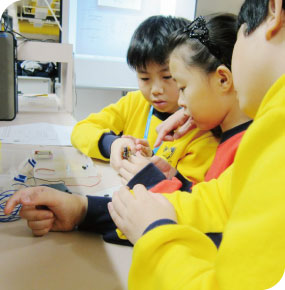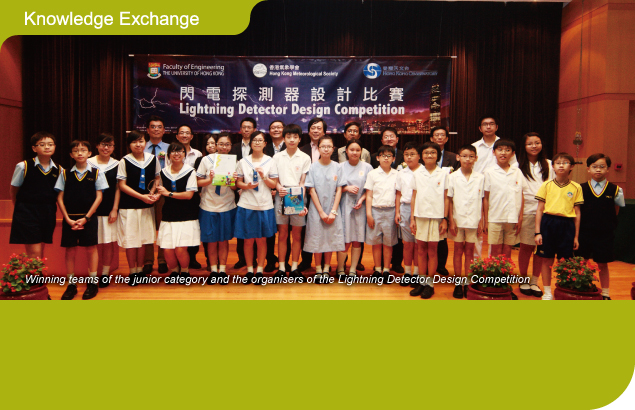The Engineering Faculty teamed up with the Hong Kong Observatory (HKO) and the Hong Kong Meteorological Society (HKMetS) to hold a Lightning Detector Design Competition to enhance knowledge in information technology and meteorological instrumentation among the younger generation. This followed another KE-sponsored competition in 2011–2012, also in cooperation with HKO, to come up with a visibility measurement method.
The Lightning Detector Design Competition drew 380 pupils from 43 primary and secondary schools who took part in talks, workshops and visits before building their devices.
At the award presentation in May, HKU Assistant Dean of Engineering Dr Wilton Fok praised the next generation of engineers and scientists for their creativity, their ability to integrate hardware with software and their excellent presentation skills.
There were prizes for the junior and senior winners and runners-up as well as awards for the most creative and the most attractive designs. Two of the entries which particularly caught the eyes of the judges were a detector housed inside a remote-controlled toy truck and a fish-eye lens connected to a webcam relaying images of the sky for analysis by a computer program.
Professor Francis Lau Chi-moon was Principal Investigator of the KE-funded competitions, which were led by two meteorological computing researchers, Dr Beta Yip Chi-lap and Dr Ivy Wong Ka-yan, who have been working together for 10 years. As well as being Fellows of HKMetS, they were also responsible for two previous, smaller competitions before the KE programme – to design a rain gauge in 2006, and an anemometer, which measures wind speed, in 2008–2009.
However, since the launch of KE funding they have been more than keen to take advantage of what it offers and have a number of other projects they hope to pursue.
“In 2013–2014, we will work on another KE project, ‘Birds of Hong Kong in your hands’, in partnership with the Hong Kong Bird Watching Society, to enable mobile device users worldwide to access multimedia information about Hong Kong birds for free,” says Dr Yip.
 Students from various primary and secondary schools participate in a workshop on ‘Light, Electric and Magnetic Field Detection’ held in December last year.
Students from various primary and secondary schools participate in a workshop on ‘Light, Electric and Magnetic Field Detection’ held in December last year.
“We hope that apart from partnerships with the government sector, knowledge exchange can be done with the general public through partnerships with non-governmental organisations. Knowledge should be free to share and be used for the good of people, and HKU has a duty to demonstrate that,” he adds.
Dr Wong agrees. “It is important for HKU to connect with the community. Through these competitions, we can share our findings and knowledge. The participants have the chance to visit the University and experience learning in the University. This two-way relationship is important.”■


